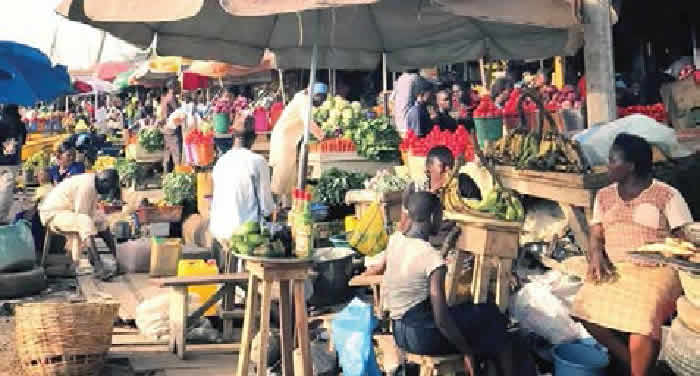The Lagos food market initiative
After a few weeks of planning and reviews, the Lagos Discounted Food Market, otherwise known as Ounje Eko, has taken off, with centres strewn across the state. It is an initiative that allows residents of the state to buy food items at a discount, currently put at 25 per cent of the prices in the […]

food market
After a few weeks of planning and reviews, the Lagos Discounted Food Market, otherwise known as Ounje Eko, has taken off, with centres strewn across the state. It is an initiative that allows residents of the state to buy food items at a discount, currently put at 25 per cent of the prices in the regular markets. As announced by the state governments, items to be sold at the market include; rice, beans, garri, bread, eggs, tomatoes, onions, and pepper, which constitute the basic items consumed daily by average households in the state and the rest of the country.
The market, planned to be held every Sunday, took off on March 17, 2024, and has witnessed large turnout by Lagosians, as they seek to take advantage of the programme to reduce the impact of the harsh economic conditions prevalent in the country. To prevent a few people from hijacking the commodities, the government pegged N25,000, as the highest value of goods that individuals can purchase per session. The government announced that prices might vary slightly from one location to another. It has also responded positively to complaints over the high prices of some items on sale. For instance, at one of the centres, it reduced the price of rice from N5,325 for a 5kg bag on the first day, Sunday, March 17, 2024, to N5,100 a week later. Similarly, a 5kg bag of beans was reduced from N6,225 to N5,175, while a 5kg bag of garri, one of Nigeria’s most popular staples, was reduced to N3,450 from N3,975.
Daily Trust commends the governor for his thoughtfulness in initiating this ingenious solution to a serious problem. By all standards, this is a good concept with good intentions from a state government. In the current economic crunch being experienced across Nigeria, we need leaders to confront problems with critical thinking. Like every novel project, the scheme that has just taken off faces some teething problems. From reports on the activities at the centres so far, there is a need for the government to open up more centres in addition to the about 41 existing ones right now. This will relieve the residents as they flock to the markets.
We also suggest that more food items should be added to the offerings. We recognise the enormity of the logistics involved in arranging for such a large number of items to be included and distributed to the various centres; however, we believe this will make the residents’ search worth the time and efforts they put in. Given that people’s purchasing power has fallen so much with the depreciation of the naira and high inflation rate, we ask that only locally produced items should feature in the offerings, at prices affordable by the people.
Additionally, Daily Trust suggests that the government should consider adding medical items to the basket as they have witnessed an astronomic price jump. As a result, many people with special medical conditions are now left on their own, some of them unable to take care of their ailments.
- Saudi King Salman distributes foodstuffs in Kano
- Ramadan: Abuja National Mosque Foundation donates food to 600 indigent Muslims
Also, as the programme firms up, the government should strengthen the monitoring teams to ensure that things are done properly. Lapses that usually derail such initiatives must not be allowed to scuttle this. Protection of the welfare of the people of Lagos must be the primary objective of the programme; so everything must be made to work properly and efficiently. Such strict monitoring will, among other things, ensure that the people who throng these centres derive the benefits they expect, especially that of price differentials and product quality.
Given the level of hunger in the country, we urge the federal and other state governments to emulate this gesture. This is a more effective and efficient way of reaching out to Nigerians in this austere time with policy initiatives that impact the lives of the citizens. A discounted food market has a verifiable impact on ordinary citizens than the chaotic and fraud-laden arrangement called palliatives.
Inflation in Nigeria rose to 31.7% in February, up from 29.9% in January. In February 2023, it was 21.91 per cent, giving an annual increase of nearly 10 percentage points, according to figures released by the National Bureau of Statistics. This implies that for families to maintain the same welfare they had a year ago, they must spend more now. Offering them discounts is a good way to achieve this.
What we have seen in many other states is for leaders to take the easy way out, mostly dishing out half-baked solutions to a fundamental problem that touches on people’s lives. Our leaders must come up with creative solutions to the challenges facing our country now, and this is most critical in the area of feeding.
